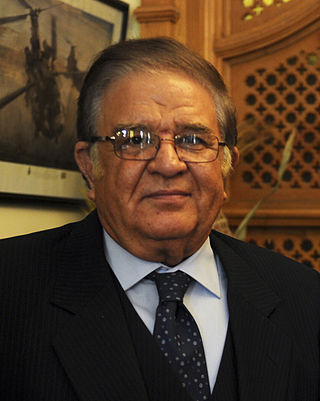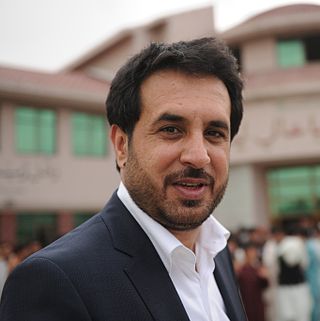Related Research Articles

The economy of Afghanistan is listed as the 124th largest in the world in terms of nominal gross domestic product (GDP), and 102nd largest in the world in terms of purchasing power parity (PPP). With a population of around 41 million people, Afghanistan's GDP (nominal) stands at $14.58 billion as of 2021, amounting to a GDP per capita of $363.7. Its annual exports exceed $2 billion, with agricultural, mineral and textile products accounting for 94% of total exports. The nation's total external debt is $1.4 billion as of 2022.

Hamid Karzai is an Afghan politician who served as the fourth president of Afghanistan from July 2002 to September 2014, including as the first elected president of the Islamic Republic of Afghanistan from December 2004 to September 2014. He previously served as Chairman of the Afghan Interim Administration from December 2001 to July 2002. He is the chief (khān) of the Popalzai Durrani tribe of Pashtuns in Kandahar Province.

Mohammad Qasim Fahim was an Afghan military commander and politician who served as Vice President of Afghanistan from June 2002 until December 2004 and from November 2009 until his death. He was considered a powerful and influential figure during the Karzai Administration.

Kandahār is one of the thirty-four provinces of Afghanistan, located in the southern part of the country, sharing a border with Pakistan, to the south. It is surrounded by Helmand in the west, Uruzgan in the north and Zabul Province in the east. Its capital is the city of Kandahar, Afghanistan's second largest city, which is located on the Arghandab River. The greater region surrounding the province is called Loy Kandahar. The Emir of Afghanistan sends orders to Kabul from Kandahar making it the de facto capital of Afghanistan, although the main government body operates in Kabul. All meetings with the Emir take place in Kandahar, meetings excluding the Emir are in Kabul.

General Abdul Rahim Wardak is an Afghan politician and former Defense Minister of Afghanistan. He was appointed on December 23, 2004, by Afghan President Hamid Karzai. Before this appointment, Wardak was the deputy Defense Minister to the former minister, Mohammed Fahim. During the 1980s Soviet–Afghan War, Wardak had been a national Mujahideen resistance leader who fought the Soviet forces. He is an ethnic Pashtun from the Wardak province. His diplomacy has been instrumental in promoting ethnic reconciliation due to his lineage from tribal chieftains with strong Pashtun relationships with all ethnic groups of the country. He is fluent in Pashto, Dari (Persian), and English.

The Taliban insurgency began after the group's fall from power during the 2001 War in Afghanistan. The Taliban forces fought against the Afghan government, led by President Hamid Karzai, and later by President Ashraf Ghani, and against a US-led coalition of forces that has included all members of NATO; the 2021 Taliban offensive resulted in the collapse of the government of Ashraf Ghani. The private sector in Pakistan extends financial aid to the Taliban, contributing to their financial sustenance.

Asadullah Khalid is a politician in Afghanistan. He served as head of the National Directorate of Security (NDS), which is the domestic intelligence agency of Afghanistan. Before his appointment as the head of the NDS in September 2012, Khalid served as the Minister of Tribal and Border Affairs. Between 2005 and 2008, he was the Governor of Kandahar Province and prior to that as Governor of Ghazni Province (2002-2005). From 2018 until 2021 he was the Minister of Defense. Khalid is said to be affiliated with the Islamic Dawah Organisation of Afghanistan and has been noted as one of many loyalists of Afghan President Hamid Karzai.
The following lists events that happened during 2002 in Afghanistan.
The following lists events that happened during 2004 in Afghanistan.
Events from the year 2007 in Afghanistan.

Internet in Afghanistan is available in all of its 34 provinces, and is used by over 9 million people as of 2022. The internet officially became available in 2002 during the presidency of Hamid Karzai. Prior to that year, it was prohibited because the Islamic Emirate of Afghanistan believed that it may be used to broadcast obscene, immoral and anti-Islamic material, and because the few internet users at the time could not be easily monitored as they obtained their telephone lines from neighboring Pakistan.

The Fall of Kandahar took place in 2001 during the War in Afghanistan. After the fall of Mazar-i-Sharif, Kabul and Herat, Kandahar was the last major city under Taliban control. Kandahar was where the Taliban movement had originated and where its power base was located, so it was assumed that capturing Kandahar would be difficult. The city fell after several weeks of fighting to a force of local militia under Pashtun military commanders and their American advisers. The fall of Kandahar signaled the end of organized Taliban control of Afghanistan.

Hamid Karzai, the 12th President of Afghanistan, was subject to several failed assassination attempts after becoming leader of Afghanistan on 20 December 2001.
The May 2010 Kabul bombing occurred on May 18, 2010, in Kabul, Afghanistan. 18 people, including 5 US soldiers and a Canadian soldier, were killed and 52 were injured when a NATO convoy was targeted by a Taliban suicide attacker. It was the deadliest attack against NATO forces in Afghanistan since September 2009, when six Italian soldiers were killed by a suicide bomber. Two full colonels and two lieutenant colonels were killed in this attack, making it the deadliest attack against ranking officers in Afghanistan. With this attack, the total number of Americans killed in Afghanistan crossed one thousand.
Events from the year 2010 in Afghanistan.
Events from the year 2011 in Afghanistan.
2003 in Afghanistan. A list of notable incidents in Afghanistan during 2003

The Arg is the presidential palace of Afghanistan, located in Kabul. Since the 2021 abolition of the Afghan presidency by the Taliban, it has served as the meeting place of the Cabinet of Afghanistan. The palace sits on a 34-hectare (83-acre) site in District 2, between Deh Afghanan and the affluent neighbourhood of Wazir Akbar Khan; it has historically been used by many Afghan heads of state, from Abdur Rahman Khan to Ashraf Ghani.
The following lists events that happened in 2013 in Afghanistan.
The following lists events that happened during 2015 in Afghanistan.
References
- 1 2 3 How the US army protects its trucks – by paying the Taliban Aram Roston The Nation, Friday 11 November 2009
- 1 2 Filkins, Dexter (6 June 2010). "Convoy Guards in Afghanistan Face an Inquiry". New York Times. Retrieved 6 July 2010.
- ↑ "Corrections". The New York Times. 10 August 2010.
- ↑ https://news.yahoo.com/afghanistan-clears-oil-deal-chinas-cnpc-181955411.html [ dead link ]
- ↑ "Afghanistan to Sign Oil Extraction Contract with Chinese Petroleum Corporation - Office of the President". president.gov.af. Archived from the original on 2012-04-26.
- ↑ Watan Group
- 1 2 Crime-buster in an Armani suit takes on private armies of Kabul The Times October 31, 2007 - Note the company name is misspelt as "Witan"
- ↑ Roston, Aram (2009-11-13). "How the US army protects its trucks – by paying the Taliban". The Guardian. London. Retrieved 2010-05-27.
- ↑ RATEB POPAL, AHMAD (16 December 2009). "Letters By Our Readers". The Nation. Retrieved 21 December 2009.
- ↑ "Taliban protection payoffs denied by contractor". CBC News. 27 April 2010. Retrieved 6 July 2010.
- ↑ Potter, Mitch (9 June 2010). "Security standoff stalls Canadian dam project in Kandahar". The Toronto Star. Retrieved 6 July 2010.
- ↑ Afghanistan bars security firms Associated Press May 9, 2010 archived version
- ↑ "Print Version: US officials to face questions about decision not to ban corrupt Afghan company « RAWA News".
- ↑ "Most Popular E-mail Newsletter". USA Today. 14 September 2011.
- ↑ Investcom, Watan Win Afghanistan Mobile Telecom Licenses Nic Fildes Cellular News 15 September 2005